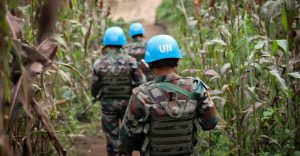
UN Peacekeepers Photo: UN
On September 29th this year the news broke that more than 50 women accused aid workers for sexual abuse in the Congo Ebola crisis response efforts during 2018-2020. It was the nonprofit news organization The New Humanitarian that after a yearlong investigation into the matter released their findings. The claims that were put forward accused unnamed male workers from mainly the WHO, but also other leading NGOs and UN agencies as well as the Congolese health ministry, for demanding sex in change for employment. Women shared stories of being pressured to have sexual relations with men to be considered for employment and of contracts being terminated when refusing to engage with the men. The practice was so widely spread that it became known as a “passport to employment” ¹.






